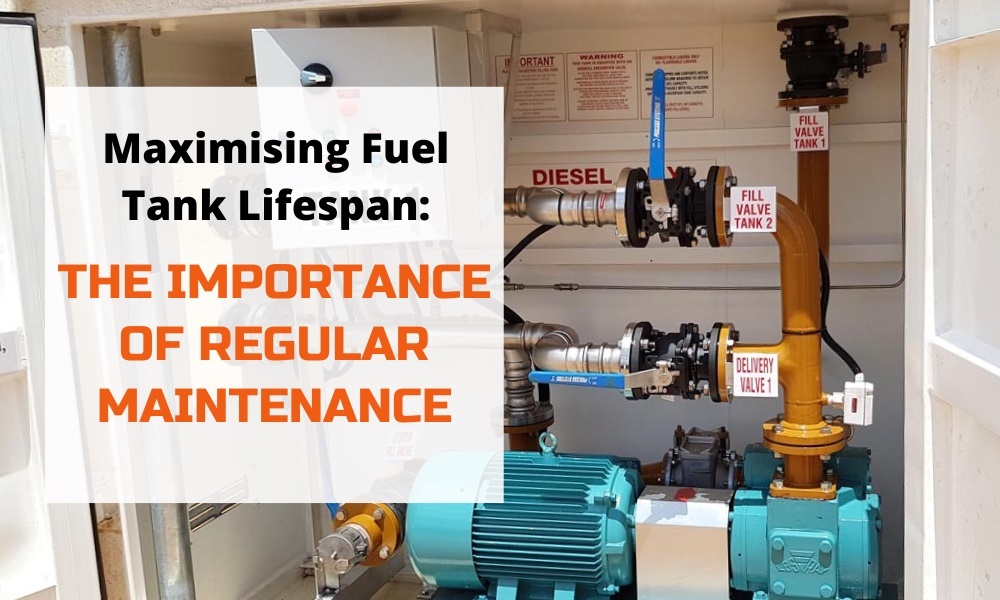Fuel tanks are vital for storing and supplying fuel for a range of applications, from generators to heavy machinery. Whether you’re managing a fleet of diesel-powered vehicles or overseeing operations on a construction site, ensuring the longevity and efficiency of your fuel tank is essential.
Regular maintenance is crucial for extending the life of your fuel tank and preventing expensive repairs or replacements. At GHASA, we understand the value of upkeep. In this article, we’ll explore why regular fuel tank maintenance matters and provide practical tips for maintaining both fuel and diesel tanks.
Understanding the Importance of Fuel Tank Maintenance
Fuel tanks, regardless of their size or type, experience wear and tear over time. Regular maintenance is crucial to ensure that your tank remains in optimal condition, preventing issues that could disrupt operations or compromise safety. Proper maintenance not only extends the life of your fuel tank but also enhances its performance and efficiency.
- Preventing Contamination and Corrosion: One of the primary reasons for regular fuel tanks maintenance in Perth, WA is to prevent contamination and corrosion. Over time, fuel tanks can accumulate water, dirt, and other impurities. These contaminants can lead to corrosion, which weakens the tank and reduces its lifespan. Regular inspections and cleaning are essential to remove these impurities and protect the tank from rust and corrosion.
- Ensuring Fuel Quality: The quality of the fuel stored in your tank is directly affected by the condition of the tank itself. Contaminants and moisture can degrade the quality of the fuel, leading to potential issues such as clogged filters and inefficient combustion. Regular maintenance helps to ensure that your fuel remains clean and effective, which is crucial for the smooth operation of your machinery and equipment.
- Avoiding Costly Repairs: Neglecting regular maintenance can lead to significant issues that require costly repairs. Problems such as leaks, corrosion, and fuel contamination can escalate if not addressed promptly. By investing in regular maintenance, you can identify and resolve minor issues before they develop into major problems, thus saving money in the long run.
Key Maintenance Practices for Fuel Tanks
To maximise the lifespan of your fuel tank, it’s important to follow a routine maintenance schedule. Here are some key practices to incorporate into your maintenance routine:
- Regular Inspections: Conduct regular inspections of your fuel tank to check for signs of damage, leaks, or corrosion. Look for any unusual signs such as rust spots, bulging, or cracks. Regular inspections can help you detect problems early and take corrective action before they escalate.
- Cleaning and Filtering: Regularly clean your fuel tank to remove any accumulated dirt, debris, or sludge. This helps to maintain the quality of the fuel and prevents contamination. Additionally, ensure that the filters are clean and functioning properly. Replacing or cleaning filters as needed is essential for keeping the fuel clean and preventing blockages.
- Checking for Leaks: Leaks can cause significant issues, including environmental contamination and safety hazards. Regularly check for any signs of leaks around the tank and its fittings. If you detect a leak, it’s important to address it immediately to prevent further damage and ensure safety.
- Monitoring Fuel Levels: Keep an eye on the fuel levels in your tank to avoid running it too low. Running a tank close to empty can increase the risk of contaminants being drawn into the system. Maintain a consistent fuel level to ensure optimal performance and longevity.
- Protecting Against Weather: If your fuel tank is exposed to the elements, ensure that it is properly protected. Extreme weather conditions, such as heavy rain or snow, can accelerate wear and tear on the tank. Consider using protective covers or installing the tank in a sheltered location to minimise weather-related damage.
Diesel Tank Maintenance: Special Considerations
Diesel tanks require specific maintenance practices due to the nature of diesel fuel. Here are some additional tips for maintaining diesel tanks:
- Preventing Diesel Bug: Diesel fuel is prone to a condition known as ‘diesel bug,’ where microorganisms grow in the fuel. Regularly treating the fuel with additives can help prevent microbial growth and maintain fuel quality.
- Monitoring Water Content: Diesel fuel can accumulate water, which can lead to problems such as microbial growth and corrosion. Regularly check for water in the tank and use water-absorbing additives or drainage systems to manage moisture levels.
- Ensuring Proper Ventilation: Diesel tanks should be properly ventilated to prevent pressure build-up and to ensure that any vapours are safely released. Ensure that the venting system is functioning correctly and free from blockages.
Maximise Your Investment: Fuel Tank Maintenance with GHASA!
Regular maintenance is crucial for maximising the lifespan of your fuel tank and ensuring its efficient operation. By incorporating routine inspections, cleaning, leak checks, and specific diesel tank practices into your maintenance schedule, you can prevent costly repairs, enhance fuel quality, and protect your investment. Prioritising fuel tank maintenance not only extends the life of the tank but also contributes to the smooth and efficient running of your equipment and machinery.
For expert advice and comprehensive fuel tank maintenance services, choose GHASA. Our team provides top-quality solutions to keep your fuel systems in optimal condition. You can also Buy or Hire Fuel Tanks in Perth.
Contact us on (08) 9359 1988 for personalised service and to schedule your maintenance today. We’re here to ensure your fuel tanks operate smoothly and efficiently.


